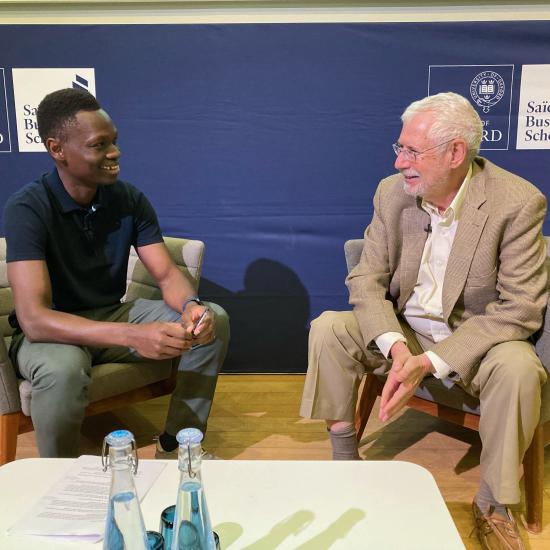From a belief in the ‘genius’ of the successful tech founder, to the magic power of certain words (‘AI’ is the current ‘open sesame’ spell for investors’ wallets), the entrepreneurship sector is crowded with myths. Not for nothing is a $1 billion tech startup known as a unicorn.
And while these myths do serve to entice increasing numbers of young people to seek careers in entrepreneurship and governments to encourage the creation of startups, they also obscure the complexity of the ecosystems necessary for successful startups to be nurtured, supported and scaled.
This is why I was pleased to welcome Steve Blank, entrepreneur, adjunct professor of entrepreneurship at Stanford and senior fellow for entrepreneurship at Columbia University, to join us for the 10th anniversary celebrations of the Oxford Seed Fund, our student-led fund that has invested 24 of the University of Oxford’s most promising startups.
With his lean startup methodology, Steve changed how startups are built, how entrepreneurship is taught, and how science is commercialised. And at our event, interviewed by Michael Tefula, Oxford Saïd alumnus, startup operator and angel investor, he explored the dynamic intersection of technology and entrepreneurship and shared his views on how technology is poised to revolutionise the startup landscape and reshape the relationship between entrepreneurs and investors.

So here are his four myth-busting ideas that, taken on board, will influence the future of entrepreneurship over the next 10 years.
Inevitably, given the audience, his advice was mostly directed to existing and future founders, but it was telling how often he talked about the need to understand and centre the thoughts and needs of other stakeholders, from customers to advisers and investors. In fact, his biggest idea may have come in an almost throwaway remark that we need to teach ‘entrepreneurship appreciation’ in the same way that we teach ‘art appreciation’ in high schools. Relatively few are destined to found successful startups, but millions will work in them, fund them, advise them, study them, and buy from them. The more people who understand the reality of entrepreneurship, the better.
Startups are a distinct management challenge
It used to be that startups were viewed as small versions of large companies, and budding entrepreneurs were taught to manage them on that basis. In particular, said Steve, ‘Startups were making the mistake of writing a business plan and thinking that when those words hit the paper they automatically became true. And became doubly true when someone funded it – but that was a flawed set of assumptions.’
Large companies execute known business models: startups search for them.
He argued that business plans work for large companies, because they know who and where their customers are, what features they want, and what pricing they are comfortable with. Large companies execute known business models.
Startups, on the other hand, are temporary organisations designed to search for repeatable and scalable business models. While an underlying plan can still be useful, it is best thought of as a hypothesis.
When the facts change, so should the plan
Thinking of the business plan as simply an untested hypothesis makes it much easier to change it when something is not working.
A business plan that is set in stone tends to feel like a contract with the investors, setting out what the start-up will deliver. It makes it virtually impossible to change: indeed, said Steve, ‘The only time you could pivot in the twentieth century was when you fired a senior executive. We never had a notion that we could fire the plan.’
The lean method, based on testing the hypothesis as quickly as possible, gives permission to change when new facts emerge.
Product/market fit is key
Startups need to be relentless in driving and understanding customer needs, to arrive at a repeatable and scalable business model.
This idea is at odds with many of the myths surrounding the big entrepreneurship ‘heroes’, characterised by their own unwavering vision that they pursue despite being told that they will never succeed. However, as Steve said, ‘You may be the smartest person in the room but you can’t be smarter than the collective intelligence of your customers’. Having said that, he viewed discovery with customers as informing the founder’s vision, not creating an ever-larger focus group.
The concept of the MVP (minimum viable product) is important in developing product/market fit as a process of discovery: matching the customers who would buy a product with the features that they need. Steve described knowing that they had achieved product/market fit with E.Piphany (a customer relationship management system) ‘when we had the fourth or fifth million-dollar deal on essentially the same product. We were no longer custom designing things – it was repeatable. When you find product/market fit, you start scaling – investing in a marketing and sales force’.
He did stress that the signs might be different in other markets and industries, and that there are no hard and fast figures, telling the audience, ‘Think – you’re about to spend a lot of money in scaling. Are you sure you have enough evidence to do that?’
Entrepreneurs need to understand how their investors are thinking
The mistake entrepreneurs make is believing that their business model and that of their investors are the same, said Steve. As an entrepreneur, you have to make sure your interests are aligned, but the business models are not the same.
It is true that if you don’t make the venture capitalist money, you will soon become an ex-CEO. But their business is not yours – nor is your investors’ motivation the same. They might care about the business, they might care about you – but they want to make money, he said.
It was an immense honour hosting Steve at our Entrepreneurship Centre. His presence and invaluable insights left a great mark on our students and community, sparking new perspectives on the future of startups and inspiring us all. The event was a true testament to the power of knowledge sharing and exploring the boundless possibilities that lie ahead for entrepreneurs and investors in this ever-evolving technological landscape.




